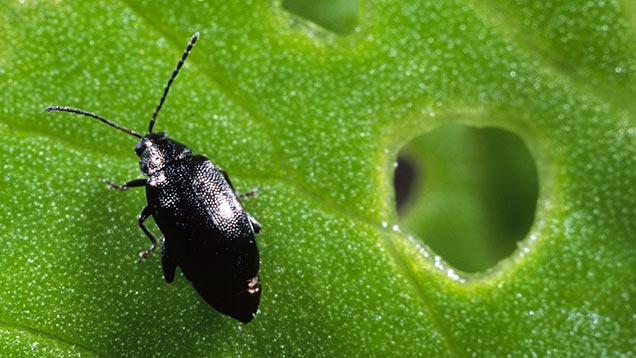Weather conditions see flea beetle activity surge in oilseed rape
 © Image Broker /Rex Shutterstock
© Image Broker /Rex Shutterstock Growers need to be vigilant as early cases of flea beetle are cropping up in parts of Lincolnshire and Suffolk following a warm, dry spell of weather.
The troublesome pest has been spotted by Lincolnshire-based AICC independent agronomist Sean Sparling, who warns that the mild, more settled conditions in recent weeks have encouraged flea beetle activity.
Mr Sparling told Farmers Weekly growers need to be checking crops on a daily basis for flea beetle presence.
See also: Wet weather to trigger slug onslaught on oilseed rape crops
“At the moment we’re seeing localised cases in the Lincoln area with crops 20% affected at the two-leaf stage and it is increasing, so we are at the threshold for treatment.
“Pyrethroid sprays seem to be working perfectly, which means there isn’t any resistance, so the cheap and cheerful approach is doing the job.”
#fleabeetle incidence beginning to increase in Lincolnshire – warmer and calmer conditions favouring activity – but all that glisters . . .
— Sean Sparling (@sasagronomy) September 6, 2015
He adds that emerging oilseed rape crops are most at risk because of the current cooler conditions, with poorly cultivated seed-beds only making the problem worse.
“At the moment we are seeing soil temperatures down to 10 degrees here, which is slowing crop growth. So far it is manageable but while things stay cold the risk of crop damage increases. Open, claggy seed-beds are especially at risk as these give the pest more places to shelter.”
@olihillFW @FarmersWeekly little to no #fleabeetle damage here in Boston, Lincs. Min disturbance and well rolled plus timely spraying.
— Jack Richardson (@JackorMinion) September 8, 2015
He also notes that growers should check that it is flea beetle rather than cabbage stem flea beetle in the crop, as dosage prescriptions differ for each.
HGCA cabbage stem flea beetle spray thresholds
Consider applying if:
- Adults have eaten more than 25% of leaf area at the cotyledon – two true leaf growth stage
- Adults have eaten more than 50% of the leaf area at the three to four true leaf stage
- The crop is growing more slowly than it is being destroyed.
Fellow Lincolnshire AICC agronomist Peter Brumpton said: “We’ve not lost any crops yet but we have sprayed once and that seems to have alleviated the problem and generally that will be enough to see the crop through emergence.
“I’d say flea beetle activity levels are about on par in terms of timing but growers do need to be keeping an eye on it.”
Growers in Suffolk and Northamptonshire are also reporting incidences of both beetle and cabbage stem flea beetle.
7 #CSFB in 24 hrs in a 9″ water trap. To spray or not to spray… pic.twitter.com/LFqEhclmN2
— Tom Jewers (@cutlerstom) September 8, 2015
@olihillFW I’ve got some #csfb on some Alizze osr drilled 23rd Aug near Northampton, it was sprayed yesterday
— Steve May (@11smay) September 9, 2015
Flea beetle damage rife even on sown areas with seed treatment! pic.twitter.com/pykdgvg6QB
— Jeremy Squirrell (@Jes_Squirrell) September 5, 2015

